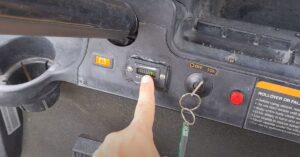Why Do Golf Cart Batteries Make Noise When Charging?
If you own a golf cart, you may have noticed that your batteries make noise when charging. This can be a cause for concern for some golf cart owners, but it’s actually a normal part of the charging process.
The noise you hear when charging your golf cart batteries is often caused by the release of hydrogen gas. As the batteries charge, a chemical reaction occurs that produces hydrogen gas. This gas can escape from the batteries and create a hissing or bubbling noise.
In this article, we’ll explore why golf cart batteries make noise when charging and what you can do to ensure safe and optimal charging.
Common Causes Of Golf Cart Batteries Making Noise When Charging With Solution
If you own a golf cart, you may have noticed that your batteries make noise when charging.
While this is a normal part of the charging process, there are some common causes of excessive noise that may indicate a problem with your batteries.
Here we will explore these causes and provide solutions to help you ensure safe and optimal charging.
Loose Connections
One common cause of excessive noise when charging golf cart batteries is loose connections. If the connections between the batteries and the charger are loose, it can cause arcing and hissing noises.
To solve this issue, make sure all connections are tight and secure before charging your batteries.
Overcharging
Another cause of excessive noise when charging golf cart batteries is overcharging. Overcharging can cause the batteries to produce more hydrogen gas than normal, leading to louder hissing or bubbling noises.
To avoid overcharging, make sure your charger is set to the correct voltage for your batteries, and avoid leaving your batteries on the charger for too long.
Old Or Damaged Batteries
Old or damaged batteries can also cause excessive noise when charging. If your batteries are old or damaged, they may produce more hydrogen gas than normal or have trouble holding a charge.
In this case, it may be time to replace your batteries to ensure safe and optimal charging.
Identifying Normal Vs. Abnormal Charging Sounds
While some noise is normal, it’s important to be able to identify abnormal sounds that may indicate a problem with your batteries or charger.
Here, we’ll explore how to identify normal vs. abnormal charging sounds and what to do if you hear abnormal sounds.
Normal Sounds
As we mentioned earlier, some noise is normal during the charging process of golf cart batteries. The most common normal sounds include
- Hissing or bubbling noise from the batteries as hydrogen gas is released
- Soft humming or buzzing noise from the charger
Abnormal Sounds
Abnormal sounds during the charging process can indicate a problem with your batteries or charger. Some of the most common abnormal sounds include
- Loud popping or cracking noises from the batteries
- Sizzling or frying noises from the batteries
- Loud buzzing or humming noises from the charger
What To Do If You Hear Abnormal Sounds?
If you hear any of these abnormal sounds during the charging process, it’s important to stop charging immediately and inspect your batteries and connections for damage or issues.
Continuing to charge your batteries with abnormal sounds can lead to safety hazards and damage to your equipment. If you’re unsure about the cause of abnormal sounds, it’s best to contact a professional for assistance.
Safety Precautions For Charging Golf Cart Batteries
When it comes to charging golf cart batteries, it is important to follow safety precautions to prevent accidents and ensure the proper functioning of the batteries.
Here are some key steps to keep in mind
Select A Suitable Charging Location
Choose a well-ventilated area away from flammable materials and direct sunlight. Avoid charging batteries indoors unless in a dedicated, properly ventilated charging room.
Inspect The Batteries
Before charging, visually inspect the batteries for any signs of damage, corrosion, or leaks. If any issues are found, consult a professional and do not proceed with charging.
Wear Protective Gear
Put on appropriate personal protective equipment, such as safety goggles and gloves, to safeguard against any potential acid spills or battery-related accidents.
Turn Off The Golf Cart
Ensure that the golf cart is turned off before connecting the charger to the batteries. This prevents electrical shocks and potential damage to the charger.
Connect The Charger Correctly
Follow the manufacturer’s instructions and connect the charger to the batteries using the proper connectors. Double-check the polarity to avoid reverse charging.
Monitor The Charging Process
While the batteries are charging, periodically check the charger and batteries for any signs of overheating or unusual smells. Immediately disconnect the charger and seek professional assistance if any abnormalities are detected.
Avoid Overcharging
Do not leave the batteries on charge for an extended period. Overcharging can damage the batteries and reduce their lifespan. Use a charger with an automatic shut-off feature or a timer to prevent overcharging.
Properly Disconnect The Charger
Once the batteries are fully charged, disconnect the charger from the power source before disconnecting it from the batteries. This minimizes the risk of electrical shock and damage to the charger.
Clean And Maintain The Batteries
Regularly clean the battery terminals and connections with a battery terminal cleaner or a baking soda and water solution. This helps prevent corrosion and ensures optimal performance.
Store Batteries Safely
If the batteries need to be stored for an extended period, ensure they are stored in a cool and dry location. Follow the manufacturer’s recommendations for long-term storage to maintain battery health.
By following these safety precautions, you can ensure a safe and efficient charging process for your golf cart batteries, prolonging their lifespan and maintaining their performance.
Frequently Asked Questions
When you charge golf cart batteries, you may notice some noise coming from them. This FAQ section will address the common queries related to this phenomenon.
Why Do Golf Cart Batteries Emit A Buzzing Sound During Charging?
During charging, golf cart batteries produce a buzzing sound due to a chemical reaction called electrolysis. This reaction releases hydrogen gas, which escapes from the battery and creates a buzzing noise.
Is The Buzzing Noise During Charging Normal For Golf Cart Batteries?
Yes, it is normal for golf cart batteries to make a buzzing noise while charging. The release of hydrogen gas during the charging process causes this sound. However, if the noise becomes excessively loud or unusual, it is advisable to have the batteries checked by a professional.
Can The Buzzing Noise During Charging Be Harmful?
The buzzing noise itself is not harmful. However, the release of hydrogen gas during the charging process can be potentially hazardous if proper safety measures are not followed. It is important to ensure adequate ventilation and avoid open flames or sparks near the charging area.
How Can I Reduce The Buzzing Noise During Charging?
To reduce the buzzing noise during charging, you can try placing the golf cart batteries in a well-ventilated area. Proper ventilation helps dissipate the hydrogen gas more efficiently, minimizing the noise. Additionally, using a high-quality charger specifically designed for golf cart batteries can help reduce noise levels.
Should I Be Concerned If The Buzzing Noise Continues After The Batteries Are Fully Charged?
If the buzzing noise persists even after the batteries are fully charged, it could indicate an issue with the battery or the charging system. In such cases, it is recommended to have the batteries inspected by a professional technician to identify and address any potential problems.
Conclusion
Golf cart batteries may make noise during charging due to various factors.
The buzzing or hissing sounds are typically caused by the release of hydrogen gas and the chemical reactions occurring within the battery.
Regular maintenance and proper ventilation can help minimize these noises for a smoother charging experience.


![What Happens If Golf Cart Batteries Run Out Of Water? [Detailed Overview] what-happens-if-golf-cart-batteries-run-out-of-water](https://giftedgolfers.com/wp-content/uploads/2023/06/what-happens-if-golf-cart-batteries-run-out-of-water-300x157.jpg)


